PowerSouth joins Alabama Power as second major company quitting BCA, citing leadership concern

PowerSouth, an energy cooperative servicing parts of South Alabama have joined Alabama Power in cutting ties with the Business Council of Alabama (BCA). In a letter to BCA Chairman Perry Hand and the BCA Executive Committee, President & CEO of PowerSouth Gary L. Smith indicated that the company believes the BCA has become ineffective under the leadership of Billy Canary. “Our problem with BCA is simply Billy Canary and his leadership. Billy has been effective in the past, but in our opinion Billy is now a severe liability and must be replaced for BCA to again be effective,” Smith said in the letter. PowerSouth’s concerns are similar to those listed by Alabama Power, “[W]e have become concerned that membership in BCA has become a liability rather than a benefit,” wrote Alabama Power CEO Mark Crosswhite in a letter to BCA Chairman Hand and Executive Committee. He continued, “To be candid, BCA has needlessly alienated federal and state officials, failed to communicate with its own members, squandered our collective corporate goodwill, allowed its financial health to decline, and become a divisive force in our State.” Read PowerSouth’s full letter to BCA below: Dear Perry: Power South has been a long, supportive member of BCA. We have supported the BCA political agenda, assisted on many BCA projects and sponsored a number of events for BCA. More recently, I have expressed our concern that BCA has lost its effectiveness and, more importantly, its way. I have described in detail many of our specific concerns about BCA’s activities, shortcomings, and relationships. You are familiar with those concerns and I will not repeat them. They are all symptoms of a more serious issue of leadership. Our problem with BCA is simply Billy Canary and his leadership. Billy has been effective in the past, but in our opinion Billy is now a severe liability and must be replaced for BCA to again be effective. You indicated the BCA Executive Committee agrees a leadership change is needed, but we have serious disagreements about the timing of the replacement, Billy’s continuing involvement in the search for his replacement, and his involvement in the leadership transition. We have no interest in participating or supporting an organization that Billy heads, influences through his choice of successor, or can manipulate through a transitional plan. It is simply time to completely sever the relationship before further damage is done to the organization. Apparently, the Executive Committee doesn’t view the leadership issues as seriously as we measure them. Therefore, you have left us no option other than to withdraw from BCA immediately. Sincerely, GARA Gary L. Smith President & CEO
Birmingham City Council unanimously approves $436 million budget

The Birmingham City Council on Tuesday unanimously approved the city’s 2019 operating budget with an 8-0 vote. District 1 Councilwoman Lashunda Scales was not present for the vote. The City Council unanimously passes the FY 2018-2019 City Budget. — Bham City Council (@citycouncilbham) June 19, 2018 The $436 million budget will go into effect July 1. The budget comes in $8 million bigger than last year’s budget, due to revenue growth from the use and occupational taxes. “Passing a budget on time is important not just to our citizens, but also for all the city departments that provide services to the public,” Council President Valerie Abbott said. “I think this budget was a good compromise. In government, you have limited resources and unlimited needs. By passing this budget unanimously today it shows that the Council and Mayor recognize we are in this together and we want to get things done.” Following the budget’s approval, Birmingham Mayor Randall Woodfin said he was encouraged by the cooperation of the Council throughout the budget process. “For me it is about taking the time to understand each Councilor’s request,” Woodfin said. “We wanted to make sure we incorporated a majority of wants and needs. We’re not able to get everything for everyone, but for the most part I think we accomplished that.”
Five things you need to know about Steve Marshall
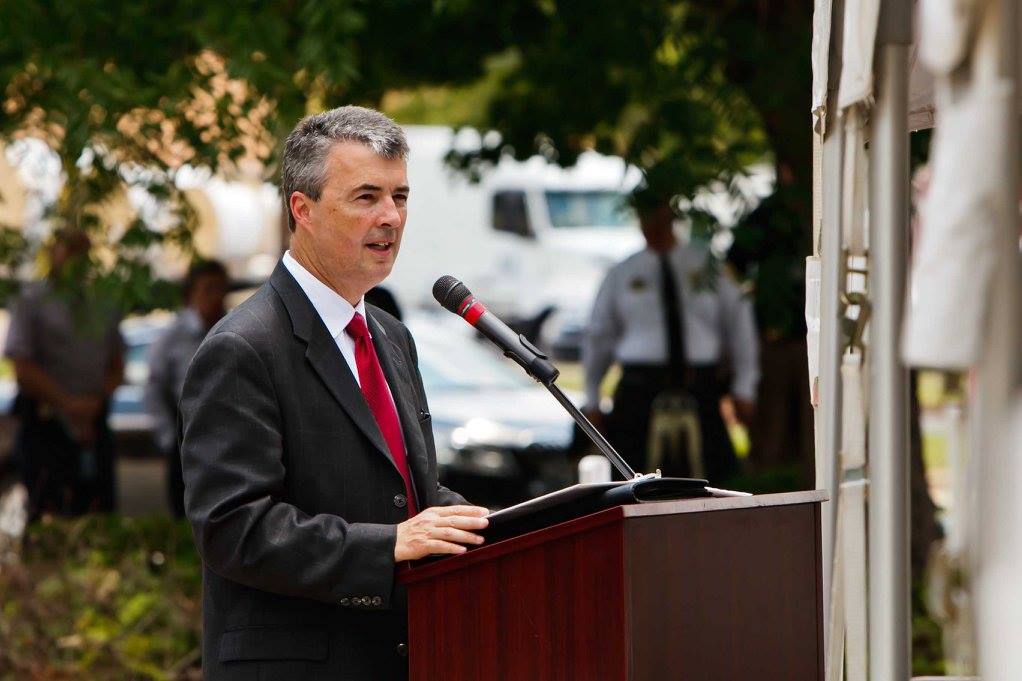
Last week, Steve Marshall beat Troy King in the runoff election for the republican Attorney General’s seat. Winning with just over 62 percent of the votes, Marshall now faces Democratic challenger Joseph Siegelman in the November general election. With that in mind, here are five things you need to know about Steve Marshall: 1. Although he moved around a lot in childhood, Marshall has always considered Alabama his true home. Although Marshall was born in Atmore, Ala. his father, Conrad Marshall, was a representative for a sporting goods manufacturer and moved the family across the southeast for most of Marshall’s childhood. They lived in Florida, Georgia, South Carolina and North Carolina, where he graduated from high school. After graduating from the University of North Carolina at Chapel Hill with his bachelors degree, Marshall moved back to Alabama to attend the University of Alabama’s law school, and stayed. “Despite leaving Alabama in first grade and living in several Southern states, Steve knew the Yellowhammer State was his home. He always knew he’d move back,” said the National Association of Attorney’s General (NAAG). 2. When sworn in as the Marshall County District Attorney (DA), Marshall became the second youngest DA in Alabama. In 2001 Marshall was appointed as the District Attorney of Marshall County. At only 36 years old his swearing in made him the second youngest District Attorney in Alabama. As District Attorney, Marshall founded several criminal prosecution and forensic programs and task forces including the Marshall County Major Crimes Unit, Marshall County Computer Forensics Lab and the Marshall County Crystal Meth Task Force. He was also instrumental in instituting and applying the Brody Act. The act holds anyone who kills or injures a mother’s unborn baby as accountable for two crimes, one against the mother and one against the baby. Marshall was one of the first DA’s to apply this law in his district. 3. As Attorney General, he filed a lawsuit against the city of Birmingham over the controversial confederate monument. In August of 2017, then-Birmingham Mayor William Bell ordered a confederate monument at the city’s Linn Park to be covered while the city explored the legality of removing it completely. “We need to take them down. We will deal with the repercussions after that,” said Birmingham City Council President Jonathan Austin. “The monuments are ‘offensive to our citizens,’” AL.com reported. Marshall quickly jumped into action. The next day the Attorney General filed a lawsuit against the city, and Mayor William Bell, saying that covering the monument violated state law. “In accordance with the law, my office has determined that by affixing tarps and placing plywood around the Linn Park memorial such that it is hidden from view, the defendants have ‘altered’ or ‘otherwise disturbed’ the memorial in violation of the letter and spirit of the Alabama Memorial Preservation Act,” Marshall said, according to AL.com. “The city of Birmingham does not have the right to violate the law and leaves my office with no choice but to file suit.” 4. He is the founder of Mentor Marshall, a mentorship program in Marshall County Marshall served as chairman of the Big Buddy Program while attending the University of North Carolina. The program, a student-led mentorship program affiliated with Big Brothers and Big Sisters of America, allowed Marshall to see the effect mentorship can have on young people’s lives. This led him to found Mentor Marshall, a mentoring program designed to impact young people in Marshall county. The program aims to find positive, successful adults and introduce them to at-risk children. The adults then serve mentors and role models to the children to keep them in school, drug-free, and to give them hope and tools to achieve their own goals. Marshall has also been mentoring two young men himself. 5. He is an elder at his church and traveled to India on a missions trip a few years ago Marshall is an elder at the LifePoint Church in Albertville, Ala. and traveled across the world on a missions trip a few years ago. There, his goal was to spread the gospel news of Jesus Christ to people who lived in remote villages in India. “The Great Commission sort of directs us all in some way to be able to make that outreach to those that don’t know Christ, to be able to share,” Marshall said of the mission, according to NAAG. This post was updated from its original version to reflect the runoff election victory.
SPLC apologizes, pays $3.3M to Islamic reformer it wrongly labeled ‘anti-Muslim extremist’
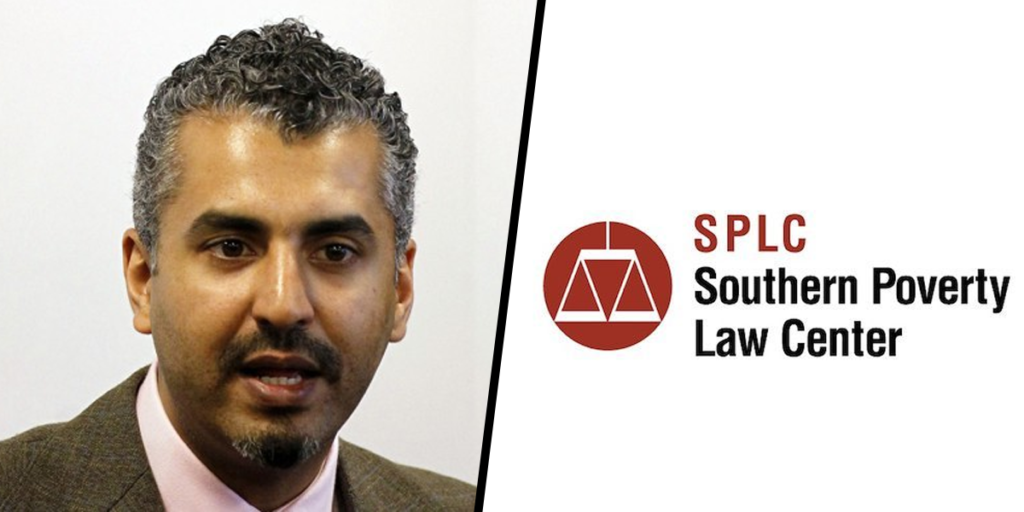
The Montgomery, Ala.-based Southern Poverty Law Center (SPLC) on Monday announced a settlement agreement with Islamic reformer Maajid Nawaz and his organization, the Quilliam Foundation, for wrongly including them on a now-deleted list of “anti-Muslim extremists.” The list, A Journalist’s Manual: Field Guide to Anti-Muslim Extremists, was published as a resource for journalists in 2016 to help identify “anti-Muslim extremists.” Nawaz, a current Muslim and a former Islamist, threatened to sue the SPLC for defamation for wrongly accusing him of being an extremist. Seeing has how they had no path to win in court, the SPLC admitted their error in inclusion and agreed to pay Nawaz and Quilliam $3.375 million “to fund their work to fight anti-Muslim bigotry and extremism.” “Since we published the Field Guide, we have taken the time to do more research and have consulted with human rights advocates we respect,” SPLC president Richard Cohen said in a statement. “We’ve found that Mr. Nawaz and Quilliam have made valuable and important contributions to public discourse, including by promoting pluralism and condemning both anti-Muslim bigotry and Islamist extremism.” Cohen said the SPLC will look to their insurance carrier to cover the cost of the settlement. “It was the right thing to do in light of our mistake and the right thing to do in light of the growing prejudice against the Muslim community on both sides of the Atlantic,” he added. Watch Cohen’s video statement below:
Birmingham pro-stoner group organizing largest public smoke-out ever

It’s certainly not the sort of protest you typically hear about — a group in Birmingham is calling on local stoners to show up for what they’re hoping will be the largest “smoke-out” ever. Organized by the Decriminalize Bham Action Committee, the smoke-out is calling on marijuana smokers to publicly light up their joints in an effort to start a conversation with Birmingham Mayor Randall Woodfin about decriminalizing cannabis in the Magic City. Scheduled for Tuesday, July 17 the smoke-out will take place at a yet-to-be-named location. “Each year, thousands of innocent men and women are arrested and incarcerated for low level cannabis possession,” posted local activist Carlos Chaverst Jr., one of the event’s organizers on Facebook. “We are asking Birmingham Mayor Randall Woodfin to join other cities across the country by decriminalizing cannabis within the Birmingham city limits.” According to a video Chaverst Jr. posted on Facebook, he’s in talks with the mayor’s office about the issue. He also said he’s personally texted the mayor about the event, but has not heard back. Chaverst Jr. says decriminalizing cannabis will help reduce the number of non-violent offenders in jails. “[Decriminalizing cannabis] will reduce the number of non-violent offenders, keep our jails and prisons from overcrowding and increases stability within the local economy,” he added. Watch Chaverst Jr. talk about the event below:
Lower costs, fewer benefits in new Trump administration health insurance option
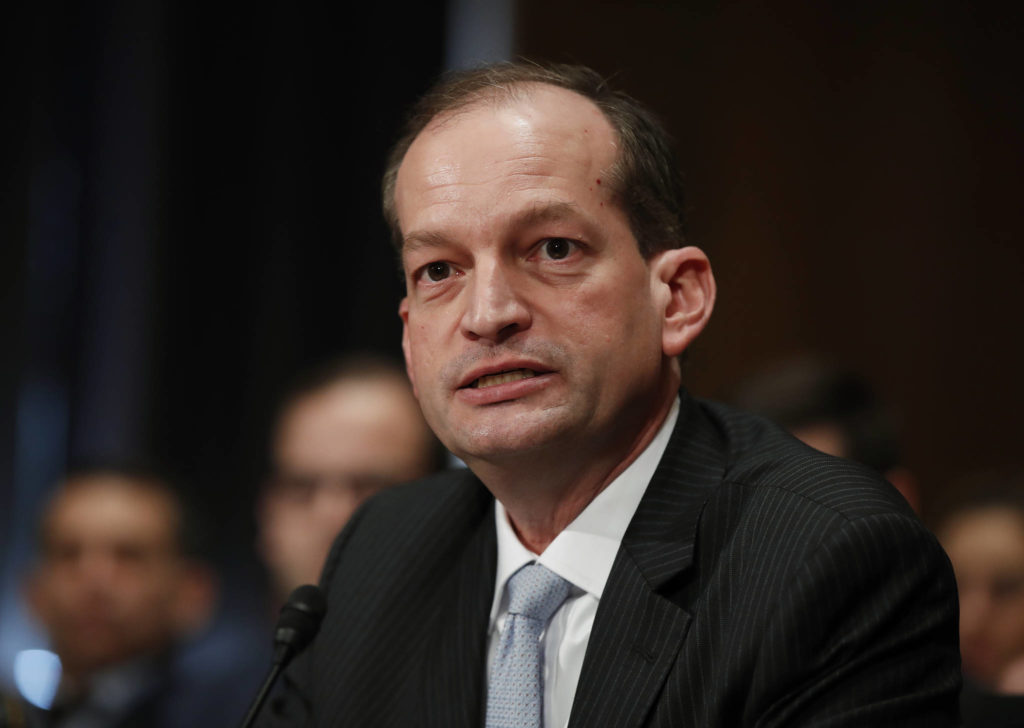
The Trump administration Tuesday rolled out a health insurance option for small businesses and self-employed people that could lead to lower premiums but may also cover fewer benefits than current plans. Labor Secretary Alex Acosta said the new “association health plans” will allow small business to pool their purchasing power, gaining access to some of the advantages that large employers have in the health insurance market. “Today the Trump administration helps level the playing field between large companies and small businesses,” Acosta said. “This expansion will offer millions of Americans more affordable health care options. The new plans would retain the same protections for people with pre-existing conditions, older workers, and women, that large company plans now have, Acosta added. Details were expected later Tuesday. The plans could be marketed across state lines within a geographic region to businesses in a given industry — auto repair shops, for example. Or a local chamber of commerce could sponsor one in a given community. The plans could be sold to self-employed people, like musicians. Allowing interstate marketing within a geographic region represents a shift from the original concept that the plans would be offered nationwide. President Donald Trump has long asserted that promoting the sale of health insurance across state lines can bring down premiums without sacrificing quality. But many experts weren’t convinced, because medical costs vary greatly according to geography. Ultimately, the idea’s success depends on buy-in from plan sponsors, consumers, insurers and state regulators. No major consequences are expected for people covered by large employers. Acosta cited enrollment estimates that predict a modest impact: about 4 million people covered by the plans within a few years, including 400,000 who would have been uninsured. Compare that to the total number of about 160 million covered by job-based insurance. After Republicans hit a dead end trying to repeal the Affordable Care Act, the Trump administration has pushed regulatory actions to loosen ACA requirements and try to lower premiums for individuals and small businesses, which now reflect the cost of comprehensive coverage. Another major initiative is expected later this summer when the administration eases rules for short-term health plans lasting less than a full year that could be purchased by individuals. Those plans wouldn’t have to cover people with pre-existing conditions, but would offer healthy people much lower premiums. Critics say the administration’s approach will draw healthy people away from the Obama health law’s insurance markets, raising the cost of coverage, which is subsidized by taxpayers. About 11 million people are covered by HealthCare.gov and state markets, but the administration’s priority is to try to lower premiums for another 7 million or so who buy their coverage directly and don’t get any help from the government. “To the extent that these plans develop and serve as a parallel market, that could have a destabilizing effect,” said Karen Pollitz of the nonpartisan Kaiser Family Foundation, an expert on individual health insurance. Pollitz also served as a consumer protection regulator in the Obama administration. “People who think they can get by without those (comprehensive) benefits will look for cheaper premiums,” she added. State insurance regulators have been concerned about association health plans because similar plans in the past had problems with financial solvency and fraud. Administration officials said Tuesday that states and the federal government would share regulatory oversight of the plans, with states retaining their current authority. The new plans will be phased in, starting in September. A small business group called Job Creators Network welcomed the Trump administration move. Group president Alfredo Ortiz said it “will create more options, more competition, and lower costs for Main Street small businesses.” Republished with the permission of the Associated Press.
Parker Snider: Monopoly and locksmiths

I love the game of Monopoly. The hope that I will land on expensive properties first, the poker-esque bluffing, and the art of deal-making with unsuspecting friends makes for a great game night. Even though I love Monopoly, I don’t always enjoy it. When I’ve missed out on important properties and am mortgaging the few I have left to pay the winner, I’m not having any fun. When it’s obvious I will not win and I slowly move from competitor to benefactor, I’m not thankful and neither are others facing a similar end. I think this distaste says something obvious: Monopoly is great for the winner. Crowding out competition and increasing prices because you have the power to do so is good sport for the already-powerful, yet detrimental to the mobility of others. Monopoly is predicated on our tendency towards self-preservation and self-centeredness. This tendency, utilized for recreation in Monopoly, is manifested in Alabama through our occupational licensing laws (also known as permission-slip-to-work laws). Take locksmiths, for example. Established in the late 1990s, the Alabama Electronic Security Board of Licensure regulates both security alarm installers and locksmiths. Not a big deal, right? Wrong. Wrong because Alabama is, as shown in a recent report, one of only 15 states that licenses locksmiths. Wrong because being in such a minority mandates we ask, “Why do we license locksmiths in the first place?” Robert Burns describes his experience as a locksmith in a video recently published by the Alabama Policy Institute. In it, he suggests that the licensing of locksmiths was established in Alabama to protect the power of practitioners – not the safety of the public – and that it makes becoming a locksmith more difficult than necessary. Before any Alabamian can work as a locksmith they must pay fees, pass tests, and wait to be approved by the government. In most of the country, these hurdles are nonexistent and residents hoping to work as a locksmith can do so when the private sector (through employers and training), not the government, deems appropriate. In Alabama, however, tendencies that should be reserved to a board game—tendencies to concentrate power towards ourselves and restrict competition—have been allowed into our occupational licensing structure. We must make every effort, therefore, to identify where licensing exists only to disincentivize entrance into a profession and to eliminate regulations where necessary. ••• Parker Snider is Policy Relations Manager for the Alabama Policy Institute (API). API is an independent, nonpartisan, nonprofit research and educational organization dedicated to strengthening free enterprise, defending limited government, and championing strong families. If you would like to speak with the author, please e-mail communications@alabamapolicy.org or call (205) 870-9900.
Five things you need to know about Troy King

The primary elections are over, but some highly sought spots still remain open due to the primary races resulting in runoffs. One of those races is for the Attorney General’s seat. In a highly contested and publicized race, Incumbent Steve Marshall and former Alabama Attorney General Troy King both garnered enough support to tip the race into a a runoff election set for July 17. With that in mind, here are five things you need to know about Troy King: 1. He was Alabama’s Attorney General in from 2004 to 2010. It’s safe to say King knows a thing or two about the day-to-day proceedings of the Alabama Attorney General’s office. He was first appointed attorney general in 2004 by former Gov. Bob Riley, after William Pryor left the office to accept federal judge position with the Eleventh Circuit Court of Appeals. In 2006, King defeated democratic nominee John M. Tyson in the November general election of that year. He served as Attorney General for one term after his election, and was defeated by Luther Strange in the 2010 Republican primary; but now he’s back and ready to ultimately find victory as the Party’s nominee. 2. He was instrumental in bringing changes to the Yellowhammer State’s sex offender laws. While serving as Attorney General, King made it his mission to bring new laws regarding sex offenders to the state. Specifically he wanted the state to require that Alabama’s sex offenders who were released wear an electronic monitoring bracelet (such as those used for those on house arrest or parole) to monitor the sex offenders whereabouts. He was so adamant about his position that he wore an electronic monitoring bracelet himself during the 2005 legislative session, until the law was changed. 3. Although he is very opposed to gambling of any kind in Alabama, he’s accepted campaign donations from out of state gambling interests. During his time as Attorney General, not only did he introduce anti-gambling legislation every year of his time in public office, he also prosecuted several electronic gambling sites, opposed a gambling expansion for the Native American tribes in Alabama, and even requested that the United States Department of the Interior deny the Poarch Band of Creek Indian’s application to broaden their gambling operations in the state. But a recent report by AL.com claims King has received “about $90,000 from five South Carolina companies and individuals with links to gaming.” According to the report, one of the major donors from South Carolina, Keith Gray, is involved in the gambling business, with one of his businesses being prosecuted in 2017 by the state of Alabama. Gray reportedly used his own name, names of family members, and business associates to donate to King’s campaign, including two companies called Open Ocean Investments and Sycamore Investments. Which have, “disconnected phone numbers, [and] share a post office box in Piedmont, South Carolina.” 4. He was the first Attorney General to sue BP after Deepwater horizon. On April 20, 2010, an explosion on an oil rig off the coast of Luisiana, called Deep Water Horizon, started a chain of events which eventually led to around 4.9 million barrels of oil being pumped into the Gulf of Mexico. The spill caused massive amounts of damage to coastal ecosystems and communities located near the gulf. Under King’s leadership, Alabama was the first state impacted by the Deep water Horizon oil spill to file a lawsuit against the oil rig’s owners, BP. “BP is now on notice,” King told CNN. “Alabama intends to hold you good to your word and to make you put our state back the way you found it.” King’s actions led to a settlement with BP in which the state was awarded $1.3 billion to be paid out over 14 years. 5. His favorite musician is Johnny Cash (at least on Facebook anyway). According to King’s campaign Facebook page, his favorite music to listen to is Johnny Cash. Cash is a very famous country artist best known for his songs “Boy Named Sue” and “Ring of Fire.”
In tit-for-tat, Donald Trump threatens more tariffs against China
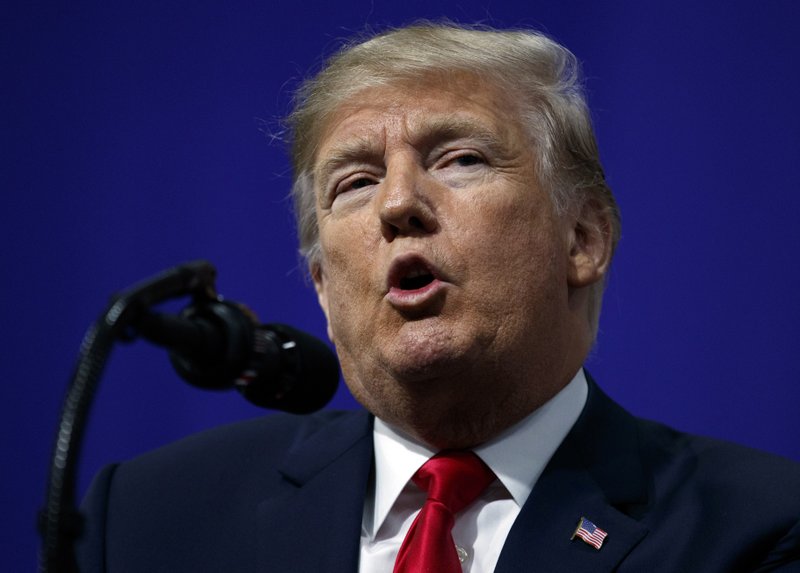
President Donald Trump has directed the U.S. Trade Representative to prepare new tariffs on $200 billion in Chinese imports as the two nations move closer to a potential trade war. The tariffs, which Trump wants set at a 10 percent rate, would be the latest round of punitive measures in an escalating dispute over the large trade imbalance between the two countries. Trump recently ordered tariffs on $50 billion in Chinese goods in retaliation for intellectual property theft. The tariffs were quickly matched by China on U.S. exports, a move that drew the president’s ire. “China apparently has no intention of changing its unfair practices related to the acquisition of American intellectual property and technology,” Trump said in a statement Monday announcing the new action. “Rather than altering those practices, it is now threatening United States companies, workers, and farmers who have done nothing wrong.” Trump added: “These tariffs will go into effect if China refuses to change its practices, and also if it insists on going forward with the new tariffs that it has recently announced.” China’s Commerce Ministry on Tuesday criticized the latest threat of tariffs, saying it was an “act of extreme pressure and blackmail that deviates from the consensus reached by both parties after many negotiations, and is a disappointment to the international community.” “If the U.S. becomes irrational and issues this list, China will have no choice but to adopt strong countermeasures of the same amount and quality,” the ministry statement said. Trump said that if China responds to this fresh round of tariffs, then he will move to counter “by pursuing additional tariffs on another $200 billion of goods.” It wasn’t immediately clear when the new tariffs could be put in place, as the trade office has yet to identify the Chinese goods to be penalized or conduct a legal review. The first round of penalties announced by both nations is set to take effect July 6. The intellectual property sanctions were the latest in a spate of protectionist measures unveiled by Trump in recent months that included tariffs on steel and aluminum imports to the U.S. and a tough rhetoric on trade negotiations from North America to Asia. The escalation in the dispute with China may also serve as a warning to other trading partners with whom Trump has been feuding, including Canada and the European Union. The move quickly drew praise from former Trump senior adviser Steve Bannon, who told The Associated Press: “President Trump told China and the world tonight that America will not back down when it comes to economic aggression.” But Wall Street has viewed the escalating trade tensions with wariness, fearful they could strangle the economic growth achieved during Trump’s watch. Gary Cohn, Trump’s former top economic adviser, said last week that a “tariff battle” could result in price inflation and consumer debt — “historic ingredients for an economic slowdown.” Trump’s comments came hours after the top U.S. diplomat accused China of engaging in “predatory economics 101” and an “unprecedented level of larceny” of intellectual property. Secretary of State Mike Pompeo made the remarks at the Detroit Economic Club as global markets reacted to trade tensions between the U.S. and China. He said China’s recent claims of “openness and globalization” are “a joke.” He added that China is a “predatory economic government” that is “long overdue in being tackled,” matters that include IP theft and Chinese steel and aluminum flooding the U.S. market. “Everyone knows … China is the main perpetrator,” he said. “It’s an unprecedented level of larceny.” “Just ask yourself: Would China have allowed America to do to it what China has done to America?” he said later. “This is predatory economics 101.” Asked to comment on Pompeo’s remarks, the Chinese foreign ministry in Beijing said in a regular briefing with reporters that the U.S. had lost credibility as a free trader. “We don’t want a trade war, but we’re not afraid of a trade war,” ministry spokesman Geng Shuang said. Pompeo raised the trade issue directly with China last week, when he met in Beijing with President Xi Jinping and others. “I reminded him that’s not fair competition,” Pompeo said. Trump had announced a 25 percent tariff on up to $50 billion in Chinese imports. China is retaliating by raising import duties on $34 billion worth of American goods, including soybeans, electric cars and whiskey. Trump also has slapped tariffs on steel and aluminum imports from Canada, Mexico and European allies. Pompeo on Monday described U.S. actions as “economic diplomacy,” which, when done right, strengthens national security and international alliances, he added. “We use American power, economic might and influence as a tool of economic policy,” he said. “We do our best to call out unfair economic behaviors as well.” In a statement, Trump says he has an “excellent relationship” with Xi, “but the United States will no longer be taken advantage of on trade by China and other countries in the world.” Republished with the permission of the Associated Press.
Donald Trump, GOP to huddle as outrage builds over border policy
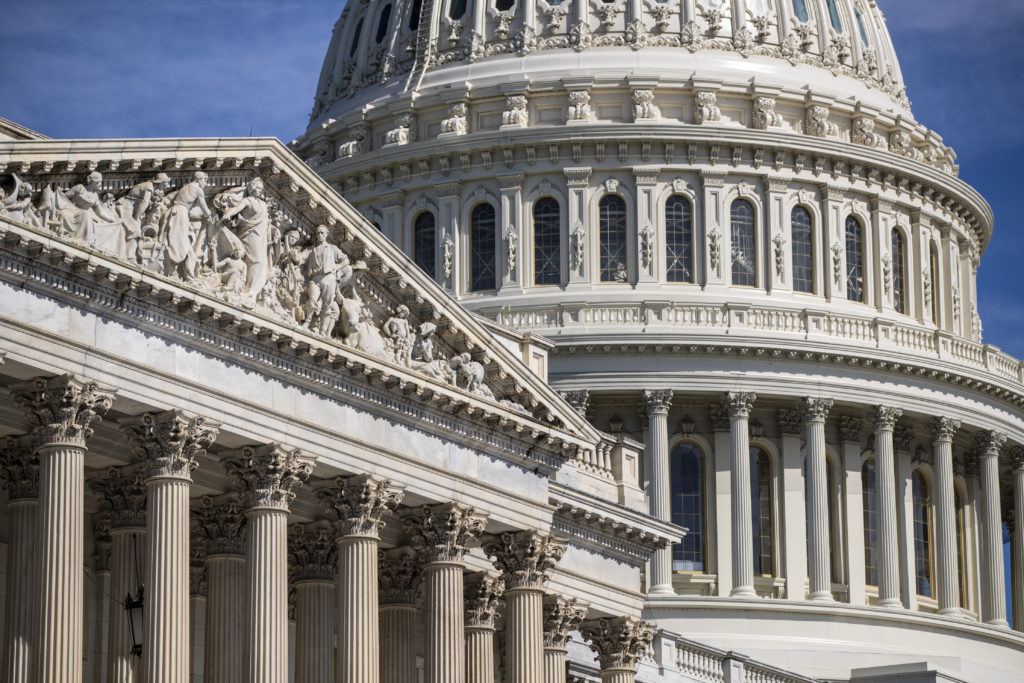
Calls are mounting on Capitol Hill for the Trump administration to end the separation of families at the southern border ahead of a visit from President Donald Trump to discuss legislation. Trump’s meeting late Tuesday afternoon with House Republicans comes as lawmakers in both parties are up in arms over the administration’s “zero tolerance” approach to illegal border crossings. Under the policy, all unlawful crossings are referred for prosecution — a process that moves adults to the custody of the U.S. Marshals Service and sends many children to facilities run by the Department of Health and Human Services. Under the previous administration, such families were usually referred for civil deportation proceedings, not requiring separation. Nearly 2,000 children were separated from their families over a six-week period in April and May. The fight is erupting as the House is already embroiled in an election-year struggle over immigration legislation that threatens to hurt Republicans in November. Democrats have seized on the family separation issue, swarming detention centers in Texas to highlight the policy. They are demanding that the administration act to keep migrant families together. Republicans are increasingly joining Democrats in that call. Michigan Republican Rep. Fred Upton called for an immediate end to the “ugly and inhumane practice,” adding, “It’s never acceptable to use kids as bargaining chips in political process.” Kansas GOP Sen. Pat Roberts said he is “against using parental separation as a deterrent to illegal immigration.” “The time is now for the White House to end the cruel, tragic separations of families,” Sen. Lisa Murkowski, R-Alaska, said in a statement. The Trump administration insists the family separations are required under the law. But after signaling Monday that it would oppose any fix aimed solely at addressing the plight of children separated from their parents under the crackdown, the White House said Tuesday that it is reviewing emergency legislation being introduced by Sen. Ted Cruz, R-Texas, to keep migrant families together. Asked if the White House supports the Cruz measure, Mercedes Schlapp, director of strategic communications, told reporters “we’re looking into the legislative text on the Cruz bill.” The senator’s bill would add more federal immigration judges, authorize new temporary shelters to house migrant families, speed the processing of asylum cases and require that families that cross the border illegally be kept together, absent criminal conduct or threats to the welfare of any children. At a White House briefing Monday, Homeland Security Secretary Kirstjen Nielsen declared, “Congress alone can fix it.” That line has been echoed by others in the administration, including Trump, who has falsely blamed a law passed by Democrats for the “zero tolerance” approach to prosecutions of families crossing the border. Two immigration bills under consideration in the House could address the separations, but the outlook for passage is dim. Conservatives say the compromise legislation that GOP leaders helped negotiate with moderates is inadequate. Rep. Jim Jordan, R-Ohio, a member of the Freedom Caucus, said he’s skeptical that even a full-throated endorsement from Trump will be enough to get the compromise bill through the House. The compromise bill shifts away from the nation’s longtime preference for family immigration to a new system that prioritizes entry based on merits and skills. It beefs up border security, clamps down on illegal entries and reinforces other immigration laws. To address the rise of families being separated at the border, the measure proposes keeping children in detention with their parents, undoing 2-decade-old rules that limit the time minors can be held in custody. Rep. Dave Brat, R-Va., another Freedom Caucus member, said he expects the GOP compromise bill to be defeated if it reaches the floor. “There’s not enough votes because it doesn’t solve the problem,” he said. Faced with the prospect of gridlock in the House, senators appear willing to take matters into their own hands. Sen. John Cornyn of Texas, the No. 2 Republican leader, said Senate Republicans are working on language to address the family separations that could receive a floor vote, potentially as part of a spending bill package. “I don’t think the answer to family separation is to not enforce the law. I think the answer to family separation is: Don’t separate families while you’re enforcing the law,” Cornyn told reporters. “It’s all within our power, and people have to overcome their desire to preserve an issue to campaign on.” Sen. Chuck Grassley of Iowa, the Republican chairman of the Judiciary Committee, said he wants to do away with a legal settlement that requires the government to release children from custody and to their parents, adult relatives or other caretakers, in order of preference. GOP senators including Lindsey Graham of South Carolina, Jeff Flake of Arizona and Susan Collins of Maine also said they’ve been discussing family separation legislation. Graham told reporters the measure would keep migrant families together, provide additional judges so detained families would face shorter waiting periods, and supply facilities for the families to stay. He said he did not know how much the proposal would cost. The administration, meanwhile, is hoping to force Democrats to vote for the bills or bear some of the political cost in November’s midterm elections. Democrats brushed aside that pressure. “As everyone who has looked at this agrees, this was done by the president, not Democrats. He can fix it tomorrow if he wants to, and if he doesn’t want to, he should own up to the fact that he’s doing it,” said Senate Democratic leader Chuck Schumer of New York. Senate Democrats have rallied behind an immigration bill from Sen. Dianne Feinstein, D-Calif. Her bill would prohibit the separation of migrant children from their parents, with exceptions for findings of child abuse or trafficking. If separations occur, Homeland Security would have to provide clear guidelines for how parents can contact their kids. One House Republican in a swing district, Rep. Mike Coffman of Colorado, said he’s willing to endorse the Feinstein bill if that’s what it takes. “I reached out to Sen. Feinstein’s office
Kay Ivey sides with Doug Jones, says import tariffs could hurt Alabama industry
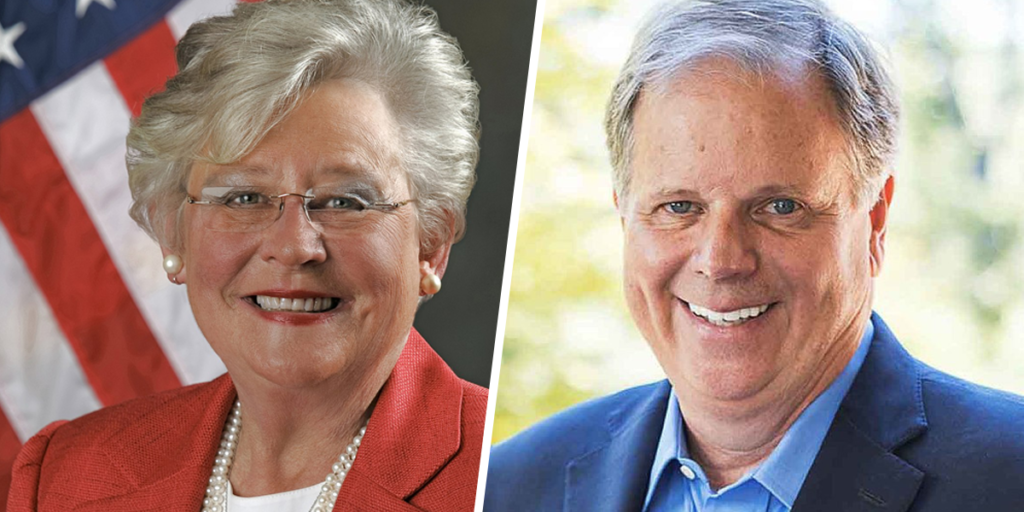
Alabama’s Republican governor is separating herself from President Donald Trump on the issue of trade, saying import tariffs like those supported by the administration would hurt the state. Gov. Kay Ivey released a statement Monday saying import tariffs could cause retaliatory tariffs that would drive up the cost of items made in Alabama and sold abroad. The administration already has imposed duties on $50 billion worth of Chinese imports, plus steel and aluminum from China, the European Union, Canada and Mexico. Ivey says growth in Alabama’s auto industry could be harmed if tariffs are imposed on U.S. goods around the world. Almost 60,000 people work in automotive-related jobs in the state. Both of Alabama’s U.S. senators, Republican Richard Shelby and Democrat Doug Jones, have previously said they oppose the tariffs. Republished with permission from the Associated Press.
Wetumpka mulls sales tax increase, first in 20 years

The Wetumpka City Council is mulling a sales tax increase Mayor Jerry Willis says the hike would be the first sales tax increase in more than 20 years. Currently, Wetumpka’s combined rate is 8 percent, the lowest in the River Region. Nearby municipalities all have higher sales tax rates: Millbrook: 8.5 percent Prattville: 9.5 percent Montgomery: 10 percent According to alabamanews.net, Willis says a one percent sales tax increase will help meet the needs of the city without having to cut services. “Hey, nobody likes taxes. We don’t like taxes. But when our auditors come to us for the past two years and give the final report and say ‘you can’t keep laying people off, Mayor,’” said Willis. He continued, “A one cent sales tax increase will generate us one million dollars. Two million dollars would give us the opportunity to take care of our employees, get them where they need to be. They haven’t had a pay increase in over five years.” The City Council did the first reading of the proposed amendment to the current tax ordinance during Monday night’s council meeting, opening the door for a future vote. The City Council is scheduled to meet next on Monday, July 2.


